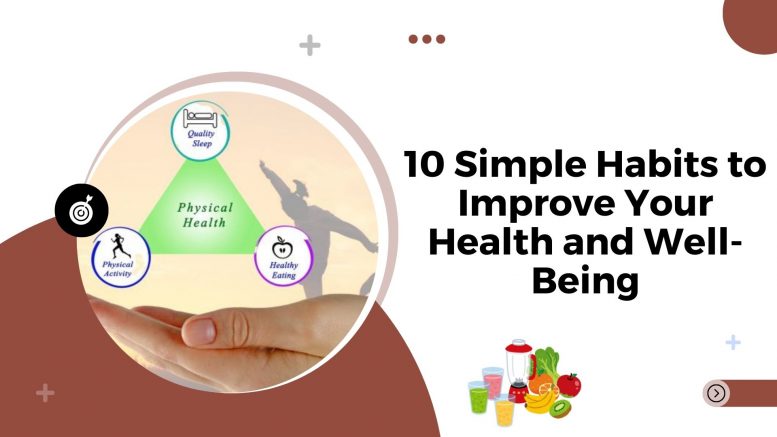Life today is fast and hard. Swamped by volumes of advice about how to keep oneself healthy, not having time to list them all down. Diet trends advise you on what and not what to eat, and even complicated workout routines which dictate not just what to do but also when and how often. There seems to be no end of all such tips and tricks promising overnight success. But the truth is simple: improving your health and well-being doesn’t have to be complicated or time-consuming. Actually, the best strategies often lie in what is simplest, the things that fit a long way into one’s lifestyle without forcing drastic changes or much effort.
We are going to examine ten simple yet powerful habits that could make for a very positive difference in health and well-being. Each one is designed to be easy to adopt and then sustain over the course of daily life. You may be looking at ways to improve your physical health, your mental clarity, or your ability to develop resilience with your emotions, and each of these habits will be essential for your journey to becoming a healthier person. Let’s dive into it and discover how little changes can sometimes make remarkable differences in your life.
Below Find the 10 Simple Habits to Improve Your Health and Well-Being
Habit 1: Get Proper Sleep
Sleep is not a luxury but a necessity for well-being. When you sleep enough, you are allowing your body and brain to reap more well-being. Ultimately, quality sleep impacts mood, cognitive function, and well-being. On the flip side, a lack of sleep will be characterized by irritability, decreased performance, and even severe health concerns.
To really enhance your quality of sleep, begin by adhering to a regular sleep schedule. Try setting a fixed bed time and wake-up time, even on weekends. The routine will already adjust your internal clock, thus falling asleep is not such a hassle as you ensure waking fresh. Develop a healthy bedtime routine which would trigger your body to relax hence preparing it for sleep. Some ideas include reading books, meditation, or warm bath..
Habit 2: Drink Plenty of Water
Water is life, but very few drink enough to sustain them. Hydration aids much in many bodily functions such as digestion, circulation, and temperature regulation among others. Hydration also helps in maintaining energy and proper functioning of the cognitive system. If a person already experiences dehydration, that may often lead to fatigue, headache, and lack of focus.
Drinking enough water can be achieved by the “8×8 rule,” meaning at least eight glasses of 8 ounces per day. Although the amount of water an individual needs may differ from one person to another, considering factors such as activity levels or climate and his or her health, a simple way is always to have a re-usable water bottle with you at all times. You can set reminders on your phone or use apps specifically designed to track your water intake.
Habit 3: Begin Regular Exercise
Exercise is usually mistaken as something annoying, but it does not have to be so. What the secret is to finding something you enjoy doing, this will make the difference. Regular exercise improves energy, disposition, and cardiovascular health. You don’t necessarily have to sit in a gym for hours on end; even if you’re incorporating small activities into your daily routine, they can make a huge difference.
For aerobic exercise, one can endeavor to get a minimum of 150 minutes of moderate or 75 minutes of vigorous activity in a week and at least twice a week on strength training exercises. Even when doing something as modest as brisk walking or cycling or even dancing, then perhaps gardening could be counted, for the good thing is finding an activity one is most keen about makes it easily possible to stay on track.
Habit 4: Eat Mindfully
In today’s hectic pace, it is easy to eat on the run or do many things while dining. Mindful eating, however, can really change your relationship with food. Primarily, mindful eating makes you pay attention to what you eat, savor each bite, and heed hunger and fullness signals from your body.
Set up a peaceful eating environment begin by setting the table, removing distractions, and pausing to enjoy your meal, along with taking small bites and appreciating flavours, enjoying the texture and inhaling aroma. At the same time, it not only improves the experience of dining but also prevents overeating, as it helps your brain process fullness.
Habit 5: Spend Time in Nature
No wonder, in such a world dominated largely by technology and urbanization, on an average, humans do not get adequate time to bring themselves closer to nature. Still, being close to nature has great benefits for mental and physical well-being. Studies have been proven that it could lower down stress, anxiety, and depression and even improve one’s mood and cognitive function.
Be in nature-the park, the beach, a hiking trail-every single day. Getting outside for even a little walk revives the spirit and opens the mind. Aim for at least 20-30 minutes per day outdoors. Consider incorporating nature into your daily agenda. Try walking or biking instead of driving, having picnics in the park, or just sitting in your own yard getting some sun.
Habit 6: Build Strong Relationships
Human connection is among the things that contribute to our wellbeing. The relations shared with family and friends help provide emotional support toward happiness and longevity. It has been revealed through studies that reducing stress and good health goes hand in hand with strong social ties.
Invest time in your relationship. The more frequent you get to sit together with loved ones face-to-face, via phone or video call, the better. Invest in meaningful conversations, good feeling, and be there for each other during when it hurts. Partake in experiences, laughter, and even vulnerability, which can deepen these relationships and foster a sense of belonging.
Habit 7: Visualize Positiveness and Gratitude
Practicing gratitude is a powerful practice for transforming one’s mindset and overall well-being. When you spend time focusing on the best things in your life, you begin to start viewing life through perspectives less concerned about what you may be lacking and more so about how to appreciate what you have. Really, it’s such a simple habit that will lead you toward greater happiness, stress reduction, and wholesome relationships.
One healthy practice that would help a person be grateful is to keep a gratitude journal-just three things you are thankful for every day, no matter how minor. This exercise reflects the good times in life and helps the appreciation mindset to settle within you over time. At times, you will see a change in your outlook as one who can find the good in bad occasions, even when problems arise.
Habits 8: Manage Stress
Stress is inevitable, but the problem can be in dealing with it. Chronic stress predicts a wide range of diseases, such as anxiety, depression, and heart conditions. Therefore, effective methods of stress management are important for one’s mental and physical health.
Identify potential stressors; many ways to overcome. Deep breathing, meditation, and yoga can be accomplished as stress-reduction measures. And, to help dissipate tension, regular breaks during the day to stretch, walk around, or practice mindfulness can reset your mind.
Habit 9: Unplug from Technology
What they can do to enhance their protective mechanisms during technology immersion: Maintain some separation from all the noise in these times of the digital age, when it’s so easy to get caught up in tons of notifications and social media updates; pressure to remain connected and always-on activities can be at a very high level. Technology has many benefits in it, but too much screen time can lead to burnout, productivity decrease, and strained relationships. Spending breaks away from technology is also crucial to mental health and well-being.
Set a few times during the day to unplug from screens- on the table, for sure, either during meals or at bedtime. You could also consider taking a whole hour out each day in the afternoon. Spend that time doing things off screen, reading, exercising, or spending some time with family or friends. Even set aside the odd “digital detox” days to “recharge the mind and body”.
Habit 10: Set Realistic Goals
It is really very common, while summarizing personal development, to determine some objectives, but one has to be sure that these goals determined beforehand for one are realistic and attainable. The more one sets himself up for success by setting workable objectives, the more possibilities he will have of keeping himself motivated and moving on. The same thing applies in health, career, or personal development through clear and achievable objectives that help to focus and give direction in life.
First, the objectives must be SMART: that is, specific, measurable, achievable, relevant, and time-bound. For example, you are not saying, “I should exercise more.” You say, “I am going to walk three times a week for half an hour.” Then dissect the bigger objectives into smaller steps because sometimes bigger might be too much, and in every step taken, be glad for reaching those short-term accomplishments.
Conclusion:
Inculcating these ten simple habits daily will lead to remarkable improvements in health and wellbeing. Recollect that success comes with consistency and the waiting game: Small changes can create many lasting transformations for the upgradation of quality of life.
Remember, also that it’s completely normal for even the smoothest sailing of paths to have ups and downs. And in most cases, improvement will take a slow process-so be gentle with yourself, and celebrate successes no matter how small they seem. You are free to continue or adjust your habits because you are finding your own way




Be the first to comment on "10 Simple Habits to Improve Your Health and Well-Being"